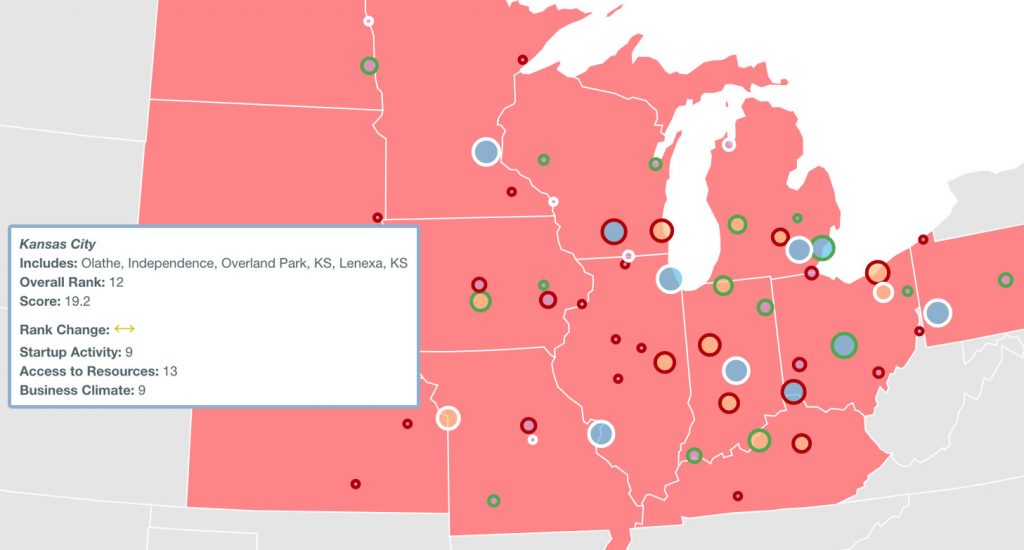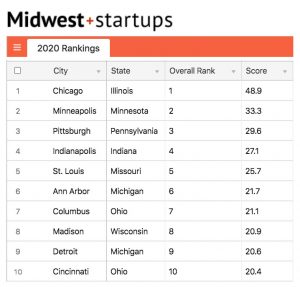Kansas City remains the “undisputed hub of startup activity in the area,” according to a new ranking by M25 — putting the City of Fountains in an enviable position as tech and startup leaders in high-priced coastal areas look for new homes in the COVID-19 era of remote work.
“Zoom may be the bane of our daily existence, but it is the great equalizer in the battle between a startup in a spare bedroom in Menlo Park and a startup in a spare bedroom in Dublin, Ohio, or Overland Park, Kansas, or Minnetonka, Minnesota,” said Victor Gutwein, founder and managing partner at M25 — an influential venture fund in Chicago with Kansas City portfolio companies like backstitch, Super Dispatch and Zohr.
Still, specific ecosystems or micro-environments play a critical role in startup success, said Gutwein, announcing Thursday M25’s 2020 ranking that examined 59 Midwest cities based on startup activity, access to resources and business climate.
Kansas City maintained its spot in the pack — ranked No. 12 with a score of 19.2 — based, in part, on “impressive” raises from C2FO and PayIt in 2019, as well as the 2020 relaunch of Techstars Kansas City, Gutwein told Startland News.
“Given the various challenges that 2020 has brought to the startup, venture capital, and grander state of business and everyday life, startups and cities that desire to grow their innovation ecosystems are in an even greater need for adaptation,” M25 said in a press release announcing the ranking. “Thus, it’s now even more interesting, telling and important to regularly measure and compare our Midwest cities against one another since each city is in a race to attract, grow and retain tech startups.
Click here to check out the full 2020 Best of the Midwest: Startup City Rankings.
The ranking marks significant improvement for Kansas City (including Olathe, Overland Park, Lenexa and Independence) when compared to its peers year-over-year, Gutwein added.
For example, Kansas City was tied for No. 12 with Milwaukee in 2019, and scored a full two points below No. 11 Detroit. This year, Kansas City stands alone at No. 12 and is only 0.4 points below No. 11 Cleveland (and only a 2.5 point gap lies between Kansas City and No. 6 Ann Arbor).
Kansas City is also clearly above its western peers, Gutwein said, noting No. 16 Omaha (13.6 points), No. 18 Des Moines (12.6 points) and No. 24 Lincoln (11.4 points).
“Perhaps most importantly, Kansas City scored higher in the Business Climate section — making the metro a favorable environment to live and start a business — which can be a leading indicator of a higher performance in the Startup Environment section (which includes the number of startups and the amount and scale of their successes) in future years,” he said.
Kansas City’s number of startups grew 50 percent in the past five years, with 60 more startups in the metro than it had in 2015, Gutwein said, citing Pitchbook data.
“This additional deluge of new startups is more than Detroit and Madison, and on par with Columbus and Cleveland,” he added.
[pullquote]“Midwest companies have much lower costs, longer runways, and are more able to become profitable. Midwest companies typically have a diverse customer base representative of the ‘average American’ and the overall American economy. And the biggest hurdles of the past — access to capital and access to experienced startup talent — have instantly eroded away.”
— Victor Gutwein, founder and managing partner at M25
[/pullquote]One of Kansas City’s glaring weaknesses compared to peer cities in Ohio, Michigan, Wisconsin and Indiana is the lack of government programs driving significant dollars to startups, Gutwein said.
“There is a tax credit in Kansas and the Missouri side has very limited public funding available for startups through MTC,” he said. “Compare that to robust tax credits in Wisconsin, Indiana and Illinois, incredibly active direct investment arms like Elevate Ventures, Ohios’ trio of Rev1/Jumpstart/Cincytech and Michigan’s InvestDetroit/InvestMichigan, and fund-of-funds programs like Indiana’s Next Level Fund and Illinois’s ILGIF, the KC metro is far behind.”
Click here to read about the defunding of Missouri’s MTC innovation investment program, which benefited M25’s portfolio company backstitch.
Defending Kansas City’s spot on such rankings could fall on peer cities’ performances, Gutwein said.
“If Milwaukee or Louisville get large raises and exits, or attract some top accelerator or have a big new fund launch, that would put KC at risk,” he said. “But KC is close to moving up if it can continue last year’s momentum.”
Click here to read more about M25’s annual deep dive into understanding the micro-environments of the Midwest and how they impact startups.










































